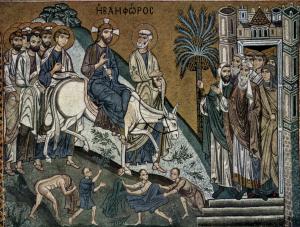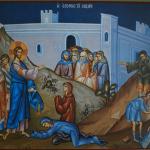
Soon after raising Lazarus from the dead, Jesus entered into Jerusalem. There, he found a crowd waiting to greet him. They were expecting him to establish the messianic kingdom. In a sense, they were right. That was exactly what he was going to do. But they did not understand what that meant. They did not understand what Jesus was about to do. The messianic kingdom was not going to be like any other kingdom on earth. It was not going to be established in power. Rather, it was going to be established by Jesus’ sacrifice on the cross.
The crowd believed Jesus would set Israel free from Roman authority. Once he did that, they thought, he would make Israel great again. He would do unto others as they had done unto Israel, but with a might greater than anyone had ever seen in history. Resistance would be useless. This was the temptation Jesus had met in the desert, a temptation which followed after him throughout his ministry. He knew the crowd. He knew their hopes and fears. He understood their desires. He knew he had the power to fulfill them. But the messianic kingdom was something far greater than this. It would welcome everyone who sought it out. Mercy and grace would be made available to all. The cry for vengeance would be overturned. The thing which would be trampled upon and extinguished is sin.
Because Jesus did not do as they expected, many within the crowd became disappointed. Disappointment led to anger. This allowed them to become manipulated by his opponents to turn on him and seek his ruin. Then, and only then, could the messianic kingdom truly be established. For it was only when Jesus was led to the cross, when he took upon himself the bitterness and anger of humanity, could he fulfill his mission and reveal the fullness of the kingdom of God.
The crowd was right in thinking that the raising of Lazarus anticipated the messianic kingdom. Jesus demonstrated he was the Lord of life and death. The messianic kingdom is the kingdom of life, but to find it, death itself had to be overcome by death. With Lazarus and others, Jesus showed there could be a temporary reprieve from death; after his resurrection, death, the final enemy, would be completely overcome.
Jesus would soon journey into the realm of the dead and join himself in solidarity with all the dead. As Jesus is the God-man, he does this both as God and man. As his divinity is eternal, there is a sense that this is a part of his eternal activity. This is why all who die will find themselves next to Jesus; he has journeyed into the realm of the dead, and he is there waiting for all who shall die, so that they can be offered a share in the resurrection.
We must therefore acknowledge the crowd did what was good and just. They participated in and celebrated the crowning achievement of Jesus’ life mission. Indeed, they experienced some of the joy of the kingdom of God:
The next day a great crowd who had come to the feast heard that Jesus was coming to Jerusalem. So they took branches of palm trees and went out to meet him, crying, “Hosanna! Blessed is he who comes in the name of the Lord, even the King of Israel!” And Jesus found a young ass and sat upon it; as it is written, “Fear not, daughter of Zion; behold, your king is coming, sitting on an ass’s colt!”
His disciples did not understand this at first; but when Jesus was glorified, then they remembered that this had been written of him and had been done to him. The crowd that had been with him when he called Lazarus out of the tomb and raised him from the dead bore witness. The reason why the crowd went to meet him was that they heard he had done this sign (Jn. 12:12- 18 RSV).
Even though they would later falter in their faith, we must not hold it against them. They were innocents. They did not truly understand all that was going on. It was because of their innocence, St. Gregory Palamas suggests, they were inspired to celebrate the coming of the Lord:
Those who were childlike in innocence but not in intelligence were inspired by the Holy Spirit to offer up to the Lord a faultlessly perfect hymn, and bore witness that, as God, He had brought Lazarus back to life after he had been dead for four days. [1]
If they were inspired by the Holy Spirit to welcome Christ, it makes them similar to Peter, who also was inspired by the Spirit to recognize Jesus as the Christ, the Son of the Living God. As Peter was to deny his association with Jesus, so many of the crowd would deny Jesus. Peter had an intimate relationship with Jesus and knew him in a way the crowd did not, and he was forgiven by Jesus. So, too, we must respect Jesus saying that those who did not know what they were doing should be forgiven (cf. Lk. 23:34); thus, even if some of the crowed were later led to yell “crucify him” to Pilate, their ignorance and their innocence suggests that Jesus has already forgiven them. Who, then, are we to look upon them in any other fashion?
The crowd played a role in the drama of Jesus’ messianic journey. They were innocent as children, capable of being inspired by the Holy Spirit. Because of that innocence, they must not to be associated with any anti-Semitic hatred which blames them for the death of Christ. They welcomed him. They brought him into Jerusalem for the installation of the messianic kingdom. That kingdom would not be fully established about until Jesus had finished his kenosis on the cross. And, if we would dare to find a reason to blame those who welcomed Jesus into Jerusalem, saying they lost their innocence, we must remember our own lives, and remember every time we sin, we lose our innocence and betray Jesus in a way worse than they, for we know what we do.
The installation of the messianic kingdom was an eschatological event. The eschaton has been immanentized and now, in every moment, we know the Lord is at hand. This should lead us to rejoice, as we ponder the mysteries of the kingdom of God. Paul, knowing this, therefore tells us to always rejoice in the Lord:
Rejoice in the Lord always; again I will say, Rejoice. Let all men know your forbearance. The Lord is at hand. Have no anxiety about anything, but in everything by prayer and supplication with thanksgiving let your requests be made known to God. And the peace of God, which passes all understanding, will keep your hearts and your minds in Christ Jesus. Finally, brethren, whatever is true, whatever is honorable, whatever is just, whatever is pure, whatever is lovely, whatever is gracious, if there is any excellence, if there is anything worthy of praise, think about these things. What you have learned and received and heard and seen in me, do; and the God of peace will be with you (Philip. 4:4-9 RSV).
Thus, we are to rejoice, celebrating not only the memory of what happened in the past, but also in our participation with it, knowing that the eschatological kingdom has been established. We can partake of it now; we can experience it now; we can sense the kingdom all around us, thanks to the work of Jesus Christ.
Since we are also still living in temporality, we can also turn our backs on Christ. We can ignore the presence of the kingdom all around us. We can ignore the prompting of the Spirit. We can be like his disciples. We can deny him, not just in words, but in deeds. Like Peter, we can be forgiven, but if we are forgiven, we must then go forth in the world like Peter, working for Jesus and the revelation of the kingdom of God, bringing mercy and grace to all those in need. For those who have been forgiven much should likewise love the Lord much and seek to do his will according to that love.
Spiritually, not only can we see ourselves in the people who celebrated Jesus’ entry into Jerusalem, we can also see ourselves in the colt and the ass which Jesus used as he entered into Jerusalem. For, many spiritual authorities suggest, we can view the colt and ass allegorically as representations of various aspects of our lives:
In the journey of this procession it is necessary that Jesus sit upon an ass and a colt of an ass; that is, that he rule the flesh, which is signified by the ass, and that he rule the spirit, which is signified by the colt, and guide them and lead them all the way into Jerusalem. [2]
We must be willing to follow Jesus. As the Son of God emptied himself and willingly let himself be directed by humanity to the cross, so now we shall empty ourselves and find ourselves directed by Jesus through the path of the cross to heavenly glory. We must cast aside all of our inordinate desires which come out of our false self, our ego. We must let that ego perish, and all that it would have us do. Then, having totally divested ourselves of all that would have kept us distant from the kingdom of God, Jesus will direct us to the heavenly Jerusalem where we will realize our true personality in God and find our true face as we come face to face with God.
Sadly, so many of us, especially those who should know better, like the clergy, have not understood this; despite the graces which are given through them, many of the clergy do not find themselves participating in the eschatological kingdom. Saddened by this, St. Anthony of Padua expressed how he wished that this were not so, that the clergy could take their place as servants of Jesus by being meek as they carry Christ into the world: “Oh! would that clergy and religious would receive, and like meek animals carry, such a king, such a rider! Then they might be worthy to enter with him the Jerusalem above.”[3] Clericalism is the opposite of what Jesus wanted for the clergy; he wanted them to be the servants of servants, not lords who lorded it over others, making the people rush to fulfill their every whim. Clergy should always take into consideration the needs of the people, not their own personal wants or interests, and make sure they lessen the burdens of the people instead of piling it up on them.
Jesus’ entry into Jerusalem is a glorious thing. We can participate in it ritually with liturgical celebrations, but we must do more than that. We must truly engage the childlike innocence of the crowd and let the Holy Spirit inspire us; we must imitate the colt and the ass as they let Jesus ride them and direct them into a place of glory. The initiation of the kingdom of heaven is an eschatological event, and so we can and should find ourselves participating in it if we want ourselves to come into Jesus’ kingdom with him. But even if we have not yet divested ourselves entirely of our egotistical, selfish way of engaging the word, we must not despair, for Jesus is willing to forgive us so long as we return to him with our love. He didn’t come into the world. He didn’t come into Jerusalem to condemn anyone. He didn’t come to be a messianic king who lorded it over others. He came to share the kingdom of God with everyone who is willing to follow after him. Let us, therefore, follow him in the spirit of love.
[1] St. Gregory Palamas, “On Palm Sunday” Saint Gregory Palamas: The Homilies. trans. Christopher Veniamin and the Monastery of St. John the Baptist Essex, England (Waymart, PA: Mount Thabor Publishing, 2009), 113.
[2] Achard of Saint Victor, “[Second] Sermon on Palm Sunday” in Achard of Saint Victor: Works. Trans. Hugh Feiss (Kalamazoo, MI: Cistercian Publications, 2001), 90.
[3] St. Anthony of Padua, Sermons for Sundays and Festivals. Volume I. trans. Paul Spilsbury (Padova: Edizioni Messaggero Padova, 2007), 220.
Stay in touch! Like A Little Bit of Nothing on Facebook.
If you liked what you read, please consider sharing it with your friends and family!












